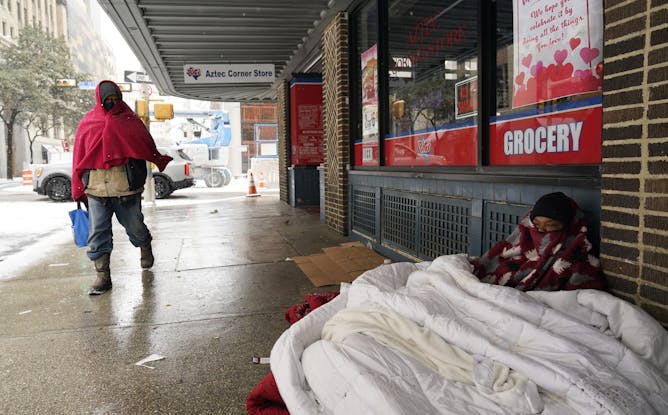|
Texans looking for a way out of the misery of a deadly winter storm that knocked power out for millions were in for a nasty shock when looking for a hotel room to wait out the cold snap. Even modest rooms in run-of-the-mill establishments were being offered for nightly rates topping $1,000. Similarly, food shortages and water outages have led to reported hikes in the cost of essentials across the state.
Price gouging is illegal in Texas, well, during a disaster in any case. But it isn’t the legality of the practice that interests Elizabeth Brake, a scholar of disaster ethics based in Houston. Nor the claims of some contrarian economists who argue that price gouging actually helps supply and prevents hoarding. What concerns her is whether the practice is defensible on ethical grounds – especially given that those worst-hit by the practice tend to be those most vulnerable to disaster conditions.
Some Texans lucky enough to have avoided the power outages still felt the financial pain. $15,000 electricity bills confronted some residents – the result of a deregulated market passing on cost to the customers, explains Penn State energy economist Seth Blumsack.
Also today:
|

Price gouging during disasters further shuts out those living in poverty.
AP Photo/Eric Gay
Elizabeth Brake, Rice University
Some economists have defended price gouging, saying it helps increase supply and prevent against hoarding. An ethicist suggests this might be missing the point.
|
Environment + Energy
|
-
Seth Blumsack, Penn State
Some Texans are receiving eye-popping electric bills after power providers passed on volatile costs to some of their customers – legally.
|
|
Politics + Society
|
-
Kevin Johnson, University of California, Davis
Words matter, writes an immigration scholar. It is far easier to deny the humanity of an 'alien' than to do so for a 'noncitizen.'
|
|
Science + Technology
|
-
Kevin Doxzen, Arizona State University
As the world has focused on the COVID-19 pandemic, other microbial foes are waging war on humans. Antibiotic-resistant bacteria pose a growing threat. But viruses may defeat them.
-
Nir Eisikovits, University of Massachusetts Boston; Dan Feldman, University of Massachusetts Boston
By letting machines recommend movies and decide whom to hire, humans are losing their unpredictable nature – and possibly the ability to make everyday judgments, as well.
-
Omolola Eniola-Adefeso, University of Michigan Medical School
There aren't just health care disparities between white and Black people. There are funding disparities too that make it harder for Black scientists to succeed in academia.
|
|
Health
|
-
Hassan Vally, La Trobe University
Surface transmission is a very uncommon way of getting COVID. We should focus most of our attention on the airborne route, potentially saving millions of dollars on obsessive cleaning practices.
|
|
Economy + Business
|
-
William Hauk, University of South Carolina
Whether the next pandemic bailout bill is called relief or stimulus depends on what ails the US economy – and maybe it doesn't matter at all.
|
|
Trending on site
|
-
Derek H. Alderman, University of Tennessee; Joshua F.J. Inwood, Penn State
Mapping is one way African Americans fight for equality and help each other navigate a racially hostile landscape.
-
Tinglong Dai, Johns Hopkins University School of Nursing
Websites that crash. Appointments that fill up within seconds. Scheduling your COVID-19 vaccine shouldn't be this hard. A few states have found a better way.
-
Andrew Latham, Macalester College
A scholar of global relations says China seems worried about its future. Meanwhile, the US and Europe still treat China as a threat. The clash of world views could be destabilizing.
|
|